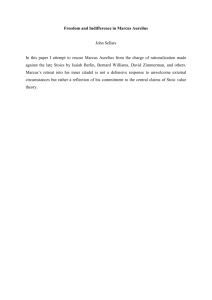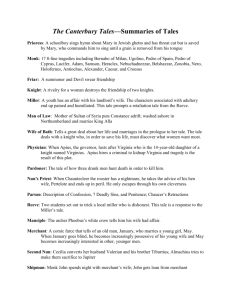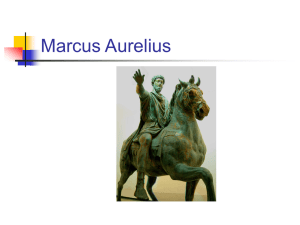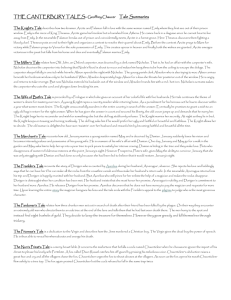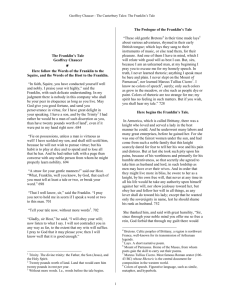The Franklin powerpoint
advertisement
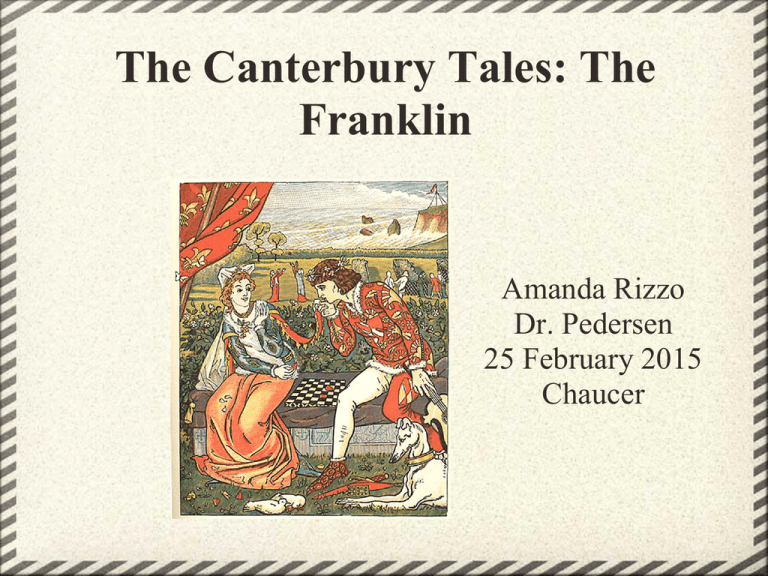
The Canterbury Tales: The Franklin Amanda Rizzo Dr. Pedersen 25 February 2015 Chaucer The Franklin ("Free Man") • Lily-white beard • Healthy red complexion • Dagger and purse made out of silk and hung from white belt • Ideal Host- “son to Epicures” (a Greek philosopher who believed that the best way to live life was to seek pleasure) • Landowner o Didn't serve a lord o Not of nobility, but surrounded self with luxury and wealth • Optimistic and Generous o always shared his food • Gluttonous over food and wine o Table always ready for food Arveragus “Knight” • Knight- “A knight once lived and served laboriously / A lady in the best way that he could” (730-1). • Lord- “In servitude? No, he was lord above, / As he had both his lady and his love—” (795-6). • Man of Chivalry • Man of Honesty • Brave Man Indeed • Man of Honor Dorigen “Knight’s Wife” • • Beautiful and of high rank-“As lovely as any under the sun / This lady was, and of high birth as well,” (734-5). Emotional-“(Dorigen) Who loved him in her heart as much as life…” “…She mourned and wailed, she fasted, lost her rest” (816-19). Aurelius “Squire” • “One livelier and brighter in array, than is the month of May... / …He better sang and danced than any man / Who is or was since this whole world began… / Among the fairest men alive; a strong / Young man, right virtuous, one rich and wise, / One loved and well esteemed in others' eyes” (926-34). Scholar “Law Student” • Pities Aurelius and helps him “clear” the rocks with his magic. • Tells Aurelius he must repay him with a thousand pounds, if not some more. Prologue - Before beginning his story, Franklin shares that this tale is originally a Breton tale. - Claims to be a “burel man” (unlearned man) - Franklin warns others about his poor story telling skill as he has “never studied rhetoric.” - He also apologizes that he will have to express the tale in a simple and plain manner. Summary • • • • • • • • • Begins by telling the others he will be telling an old story About: a knight, Arveragus, who loved a woman, Dorigen Dorigen agrees to marry him and have an equal marriage Arveragus leaves for Britian for 2 years— leaving Dorigen devastated and depressed Dorigen’s friends attempt to cheer her up—but fail Dorigen-fears dangerous rocks in the sea by her home Dorigen- courted by a Squire, Aurelius—whom she rejects and he becomes upset Agrees, jokingly, to be with him if he can remove all the rocks on the coast of Brittany. Averagus returns home from his voyage of 2 years Summary Continued • Aurelius lay in torment, and without comfort – except, that is for his brother, a clerk, who suggested that he meet a student of law at Orleans who was versed in the sciences of illusion and magic • The scholar, or law student, agrees to “remove” the rocks as long as Aurelius pays him a thousand pounds, Aurelius accepts • With rocks “removed,” Dorigen realizes she must kill herself for being unfaithful to her husband • Dorigen tells the truth to Averagas-He insists she fulfill her promises, so she does • Aurelius decides not to force her to keep her promise • Scholar, decides to forgive the money owed to him by Aurelius Themes • Chivalry- Aurelius realizes Dorigen and Averagus are truly in love. Set aside his own desires to allow the couple to remain together • Greed- The squire wants a woman who is not rightfully his, the magician initially wanted a large sum of money for helping the squire, Arveragus would let another man have his wife, and Dorigen considered upholding her promise, even though that would betray her husband. • Selflessness- Student-magician appreciates Aurelius’ act of chivalry to Dorigen, and Arveragus cancels enormous debt out of goodness. “Do good, receive good.” • Suicide- “Now since these maidens showed such scorn outright / Of being defiled to make man’s foul delight, / Well ought a wife rather herself to slay / Than be defiled, I think, and so I say” (690). • Love- Dorigen and Aruelius were married and in love. • Promises- Dorigen promised to always be faithful to her husband Arveragus in marriage. She also promised her love to Aurelius if he completed her wishes. • Others: Honesty, Honor, Lust, Marriage, and Trust. *Critical Thinking Time* So far, I have mentioned three of the deadly sins, love, lust, and greed. Can you recall another one, that I mentioned in the beginning of my presentation, which also fits into a theme of The Franklin’s Tale? Gluttony The Franklin is a gluttonous man because he overindulges in food and wine. Metaphors • “And truly the craft of man’s hand had so curiously arrayed this garden that never was a garden of such beauty, unless it would be paradise itself” (912). • “Upon this dance, among other men, there danced before Dorigen a squire who was fresher and more joyful in apparel than is the month of May, I believe” (942). • “…and die he must, he said, as did Echo for Narcissus 14, who dared not tell her woe” (959). • “He carried it under his breast more secretly than Pamphilus carried his love for Galatea 22” (1115). • “His breast was whole, to outward view, but ever in his heart was the keen arrow 23” (1115). Allusions • Moon and Lunar phases (1130-1131)- “Touching on the eight and twenty stations / Or mansions of the moon” • Bretons (Britouns)- inhabitants of Brittany in France. • Mount Parnassus (Parnaso)- home of the Muses. • Cicero (Scithreo)- the Roman orator and writer. • Echo / Narcissus (Ekko / Narcisus)(951-2) Echo, whose love for Narcissus was not returned; she yearned for him until nothing was left but her voice. • Apollo- the god of the sun. • Luna the Serene (Lucina the Sheene)- the goddess of the moon. • Delphi (Delphos) (1076)- the home of the oracle of Delphi, who issued prophecies. • Alnath (1281)- a star in the constellation Aries. • Dorigen's Lamentations (1397-1455)- a recitation of women, most of whom took their own lives rather than disgrace themselves. • “Son to Epicures”- a Greek philosopher who believed that the best way to live life was to seek pleasure. Moral • Never make a promise you do not intend to keep. • For example: “But now, Upon my faith, you'll be true to your vow! / As surely as may God be kind to me, / Dead from a stabbing I would rather be, / Because of this deep love I have for you, / Than see you to your promise be untrue. / A vow's the highest thing that one may keep” (1773-9). • Quote explained: Arveragus, the knight, tells his wife to keep her promise because he would rather suffer than to have her break her word. • Another example: “I’d rather suffer woe my whole life through / Than to divide the love between you two. / So, madam, I release you here and now, / Returning to your hand each oath and vow…” (1330-33). • Quote explained: Aurelius is pleased that she has kept her promise to him, although he would rather her return to her husband and keep her marriage promises, than to have her break one. Personal Evaluation – I thought this tale was intriguing because it displays a sense of humanity. – Humanity is an important value held by very few people. – Having this value shows a natural human nature to be compassionate for other people rather than oneself. – I also like the aspect of honesty, truth, and promises. – For example: Once Dorigen is honest with her husband by telling the truth, Arveragus tells his wife Dorigen that she must keep her word, or promise, to Aurelius. – I feel that honesty, trust, and promises mean the world to many, especially myself. – Therefore, I enjoyed that this tale taught the lesson to always keep a promise and be honest. Last Hoorah of Critical Thinking • The Franklin ends with the question: “To you this question, lords, I now address: / Which one of them showed greatest nobleness? / Give me your thoughts before we further wend. / That's all I have, my tale is at an end” (1621-4). • How would you answer this question? • Why do you think the Franklin told this kind of story? An Entertaining, 7 Minute Clip https://www.youtube.com/watch ?v=LdTKmlbzKkg References • Chaucer, Geoffrey, and Gerald NeCastro. “The Franklin’s Tale” 2007. Web. 21 Jan. 2015. • Foster, MS. "The Franklin's Tale - Animated." YouTube. 15 Nov. 2012.Web. 16 Feb. 2015. • "From Geoffrey Chaucer's "The Canterbury Tales", The Knight's Tale, Lines."From Geoffrey Chaucer's "The Canterbury Tales", The Knight's Tale, Lines. Web. 18 Feb. 2015. • Google-images.com • Pedersen, Dr. James. "Characters from Prologue." Felician College. Web. 18 Feb. 2015.
